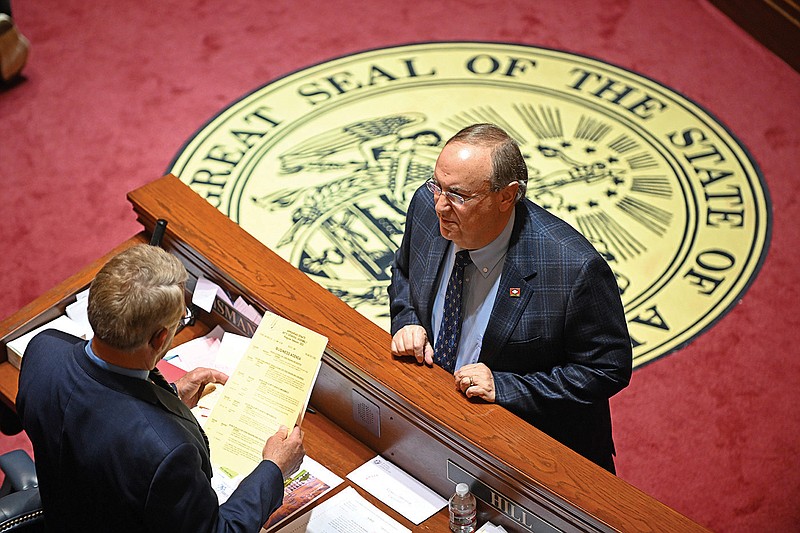The Arkansas Senate on Wednesday narrowly approved a bill to prohibit public school employees from calling students by their preferred name or pronoun without permission from a parent.
The Senate voted 19-5 to send House Bill 1468 by Rep. Wayne Long, R-Bradford, to Gov. Sarah Huckabee Sanders. Eighteen votes are required in the 35-member Senate for approval of the bill.
The Senate initially voted 20-5 to approve the bill. But opponents of the bill used a procedure called sounding the ballot under which only the votes of senators sitting in their chairs when their names are called by the Senate's secretary are counted, and that shaved one vote from the tally.
The bill would require a teacher to have written permission from a parent or guardian to address a student by a pronoun "inconsistent with the unemancipated minor's or student's biological sex," or name other than the one listed on the birth certificate. The bill also would prohibit public schools and universities from punishing staff for not using a student's preferred name or pronoun.
A person who is harmed by a violation of the bill may bring a cause of action for injunctive relief, monetary damages, reasonable attorney's fees and costs; and any other appropriate relief under the bill. A student would not be subject to any disciplinary action for declining to address a person using a name other than the name listed on the person's birth certificate, or pronoun or title that is inconsistent with the person's biological sex.
Sen. Mark Johnson, R-Ferndale who is the bill's Senate's sponsor, told senators he considers the bill to be a measure to protect teachers and their employment rights.
He cited a story about a friend, Nicholas Meriwether, a philosophy professor at Shawnee State University in Ohio who was fired for not using a transgender student's preferred pronoun. Meriwether sued the university and later agreed to a $400,000 settlement in April 2022, according to NBC News.
"We are not going to pick on kids," Johnson said.
But Sen. Linda Chesterfield, D-Little Rock, who is a retired teacher, said the bill would eliminate the spontaneity that comes with teaching because "sweetheart is a nickname."
She said she never saw a birth certificate of a student in her 30 years of education.
"I know many of you are hung up on the he and she and the they and all that other stuff, but that's not all this bill does. It puts an onus on the teacher to try to find out something that is nebulous at best," Chesterfield said.
Sen. Clarke Tucker, D-Little Rock, said the bill creates a mechanism for teachers and schools to be sued unless they follow the specific guidelines outlined in the poorly-worded bill, and it's an odd way to protect teachers.
Johnson acknowledged the bill "would potentially out" a student to their parents.
"This is not about nicknames," he said referring to the bill.
Johnson said "once again, this [bill] is to protect teachers.
"You can try to twist it whatever way you want to, but that's what it is really about," he said.
Long told the Senate Education Committee last week the bill would protect the right of conscience for public school staff who do not want to use a student's preferred pronoun or name and notify parents if students ask a teacher to refer to them by a name or pronoun of their preference.
The bill would not apply to derivatives of given names such as "Bob" for "Robert," he said. But school staff would not be able to refer to students by nicknames without written approval from a parent or guardian.
Long said he tried to exempt nicknames from the bill but could not find a way around it.
"There may be some hassles basically as far as the nicknames are concerned, but I think that pales compared to the downside of not doing anything," he said.
The bill has drawn a rebuke from the American Civil Liberties Union of Arkansas and Arkansas Advocates for Family and Children, who have said the bill is aimed at transgender students, many of whom are bullied and suffer from depression and anxiety.
"House Bill 1468 would give free rein to faculty members, teachers, and employees of public schools and state-supported higher educational institutions to disregard and disrespect students' names and pronouns, thereby inviting them to out trans students publicly to their peers," ACLU of Arkansas President Holly Dickson wrote in a letter to Sanders.
"It would also limit the speech of school employees who wish to affirm a trans student's gender identity."
